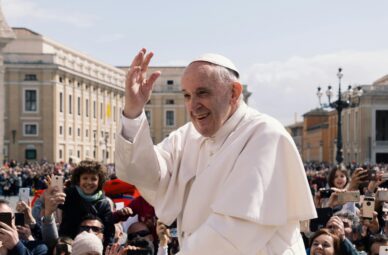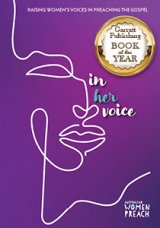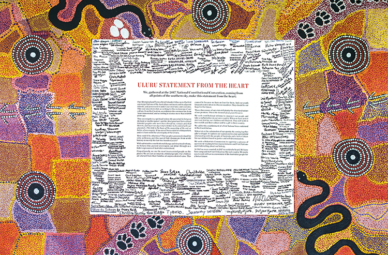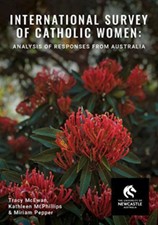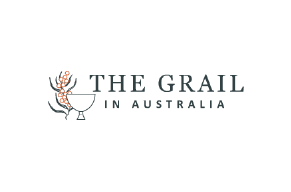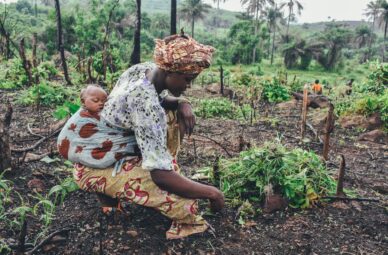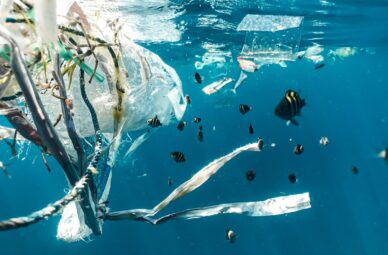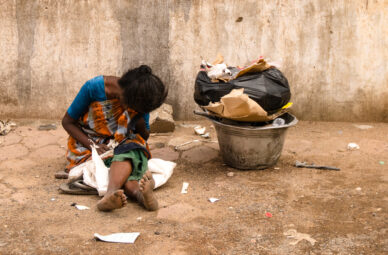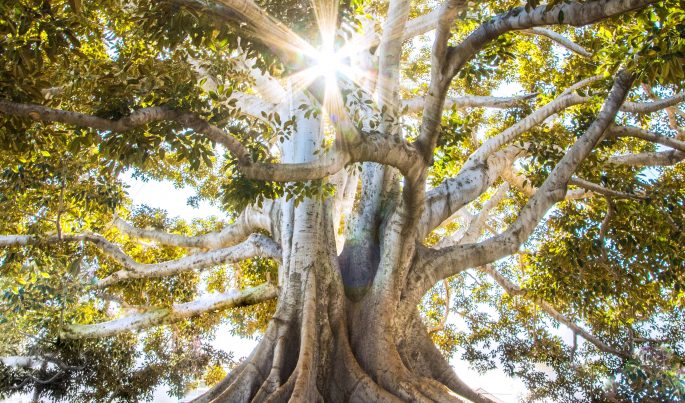
A Sermon by Patricia Gemmell delivered at Pitt St Uniting Church (on Zoom) on Sunday 3 October 2021
October 12, 2021Today is the last Sunday in the Season of Creation, which ends tomorrow on the feast of St Francis of Assisi. Looking at today’s gospel through an ecological lens allows us to reflect on our need for spiritual conversion, what that conversion might look like and entail, and how St Francis can help us through the example of his own life journey.
In today’s gospel Jesus is asked a question about divorce. Jesus refuses to be drawn into the legal argument; instead, he points out that Moses wrote that particular commandment because of their hardness of heart. However, God’s intention, from the beginning, was that man and woman would be united in equality and mutual reciprocity, not in the kind of patriarchal marriage the Pharisees are talking about, where a man may dismiss his wife if he chooses. Jesus is very clear about the equality of man and woman. We see this in his private comments to his disciples later on, as well as in his allusion to the creation story of Genesis 2. Although this story has often been interpreted as demonstrating man’s superiority over woman, it has been successfully argued by feminist scholar, Phyllis Trible, that this interpretation is not at all supported by the text. “The rib,” she says, “means solidarity and equality.” Biblical scholar, Mary Coloe, puts it as bluntly as this: “This sinful world is patriarchal…it is not part of God’s original desire described in Gen 2. Patriarchy is not of God.”
So what we have in these two readings is an intimation of a divine purpose that we human beings have failed to live up to. Life was meant to be so much better than this. What has gone wrong? The key word here, in my mind, is hardness of heart. In Greek, the word Mark uses is sklerokardia, a strikingly uncommon word in the New Testament.
It is sklerokardia that is the problem – our problem as human beings. What is called for, what is always called for, is conversion of heart. And I know I am not telling you anything new here. You and I who have been on this journey of discipleship, for long years now, know that this is the challenge of every new day. But what IS new for us is the changing landscape of the last few decades, our growing awareness of the climate crisis, of how much damage we have done and continue to do to creation, of how our comfortable lifestyles and our addiction to convenience are part of the problem, and, in response to all this, a whole new body of literature that urges us to make what is nothing less than a quantum leap in spiritual evolution.
In May 2015 Pope Francis published Laudato Si’: On Care for our Common Home, an encyclical letter on ecology and climate. As a Catholic myself, I regret to say that few Catholics I know have read it. However, that may be about to change. Just two months ago the Australian Catholic Bishops launched their annual Social Justice Statement, called Cry of the Earth, Cry of the Poor, which they hope “will ground and inspire comprehensive and effective responses…from all who want to care for our common home in this time of great need.” It’s an excellent statement and I do recommend it to you. Tomorrow will be launched, from the Vatican, a seven year journey towards seven Laudato Si’ goals, known as the Laudato Si’ Action Platform. This is open to any individual or community who wish to commit themselves to ongoing strategic action to care for creation, and will be supported by a growing database of resources and ideas.
Laudato Si’ is an urgent plea to the world to wake up. It critiques our modern Western lifestyles, which are destroying the planet and crushing the poor. It suggests alternative ways of being in the world. In the last chapter, there is a short section entitled “Ecological Conversion.” This is where my own passion lies – the interior, spiritual conversion that is the necessary foundation for real change of attitudes and lifestyle.
My own journey of ecological conversion began in 2012 when I was privileged to study ecology, cosmology and spirituality with Denis Edwards, an outstanding Australian eco-theologian. A few years later I was asked to give 5 lectures on eco-theology and spirituality. During six months of research and writing, the most challenging book I read was the one written by Anglican theologian Sallie McFague at the end of her long life: Blessed Are the Consumers: Climate Change and the Practice of Restraint.
In this work, McFague is driven by the urgency of the ecological crisis and the quintessential question of what is needed for us to comprehensively change our lifestyles. She believes that what we need to do is to be able to see the world as our body. She wants us to be able to say, with utter truthfulness, “The world is my body.” This is resonant with Pope Francis’ words in Laudato Si’ when he says: “Our goal is not to amass information or to satisfy curiosity, but rather to become painfully aware, to dare to turn what is happening to the world into our own personal suffering and thus to discover what each of us can do about it” (19). McFague calls this new way of looking at the world “the universal self,” the self that has no boundaries.
In order to develop this universal self, she proposes that we start by embracing voluntary poverty as a wild space, a place to stand and to interpret one’s culture from the “outside,” as it were. This opening allows us to see differently, to imagine other possibilities, to pay attention to others…It is a movement that most religions find to be essential to change, real deep change, change of mind and behaviour. Many call it “conversion.” It is the beginning of a long process of discipline, patience, and self-emptying that allows us to recognize that something outside of ourselves is real and has needs.
I found this to be radically challenging, and McFague acknowledges that she herself falls far short of her own ideal, which is perhaps comforting. And yet…
And yet, blessed are the poor, says Jesus in Luke’s gospel. Blessed are the poor in spirit, says Matthew’s Jesus. “Sell all you have, give to the poor and follow me,” says Jesus to the rich young man. “It is easier for a camel to go through the eye of a needle than for a rich person to enter the kingdom of God." Jesus himself embraced a life of voluntary poverty. To see this, as McFague does, as “a long process of discipline, patience and self-emptying” is just one way of describing what it might mean. There are many others: recognising our poverty as creatures, our total dependence on God, our neediness; not being attached to possessions; surrendering to the will of God; understanding what is enough; cultivating the spaciousness of the human heart; self emptying and self sacrifice. But however you imagine voluntary poverty, it is an ecological virtue that I think we need to grapple with.
Of course, when we think of St Francis, the first thing that springs to mind is his radical voluntary poverty, is it not? And it was this poverty which freed him to look at the whole of creation with wonder and awe and reverence as the revelation of God’s love and beauty, and to experience himself as one in kinship with every living creature. “Laudato Si’, mi’ Signore,” are, in fact, his words, meaning “Praise be to you, my Lord,” repeated over and over again in his famous Canticle of the Creatures.
Francis was known for his love of animals and his deep compassion for suffering human beings. He was also known for his rigorous asceticism, much of which we would today consider extreme, and for his devotion to hours spent in silent prayer. But he was also an active player in civil and political life. In the well known story of the wolf of Gubbio, Francis acts like a diplomat, brokering peace between the citizens of Gubbio and the wolf who had been terrorising the district. In another well known story he risked his life to visit the Sultan of Egypt during the Crusades, and stayed with him for several days. The Sultan was deeply impressed by his holiness as the two men spoke of spiritual matters, and later went to great lengths to bring about peace between himself and the Crusaders.
Francis was truly a saint for just about every occasion, but we honour him especially as the saint of ecology, and this is no doubt why our current Pope chose the name Francis. What both of these men called Francis invite us to is a real change of heart, from sklerokardia, or hardness of heart, to an open heart, capable of holding the whole universe in a loving and compassionate embrace. Laudato Si’ calls us to a “profound interior conversion,” through which we learn a new way of relating to creation and to one another, changing our lifestyles in the process in an awareness that everything we do matters. It also calls us to a community conversion, which means that our communities of faith are particularly important for leading us to new ways of living an integral ecology.
And finally, I must say something here about the place of contemplation. In the Franciscan tradition, as indeed in all religious and spiritual traditions, contemplation is the key to the spaciousness of the heart. Pope Francis invites us to “a prophetic and contemplative lifestyle” in Laudato Si’. Such a lifestyle can only spring from regular contemplative practices. This, of course, involves a certain amount of discipline, and it was a wise woman who wrote, “the best spiritual practices are those you are prepared to do.” Silent meditation is regularly promoted as one of the simplest and most accessible of such practices, and I would even call it a practice of voluntary poverty. As a practitioner myself, I can attest to its power of transformation, but each of us who is serious about caring for the earth will need to find our own regular practices that centre us in the heart of God.
I have recently been re-reading a little book called Care for Creation [a franciscan spirituality of the earth]. There is a whole chapter on Franciscan contemplation, in which this striking question is asked: “How can we regain a sense of God-centeredness in our lives where we live with contemplative vision, where creation is celebrated as the pouring out of God’s gracious goodness, where the inherent dignity of each living being is recognized and valued as expressing the infinite love of God?”
This is the question I want to leave you with today, a question that simmers beneath today’s gospel. The Pharisees want to know the rules of the game. Jesus, in pointing to their hardness of heart, shows how blind they are to God’s gracious goodness and the inherent dignity of each living being. How can we regain a sense of God at the heart of creation? How can we live with such contemplative vision?
Patricia has a Masters in Theology, is a member of the Australian Grail National Leadership Team and has been a parishioner of St Leonard's Naremburn for 34 years.


